
Thursday June 8, 2017
What happens if there is no clear winner of the general election?
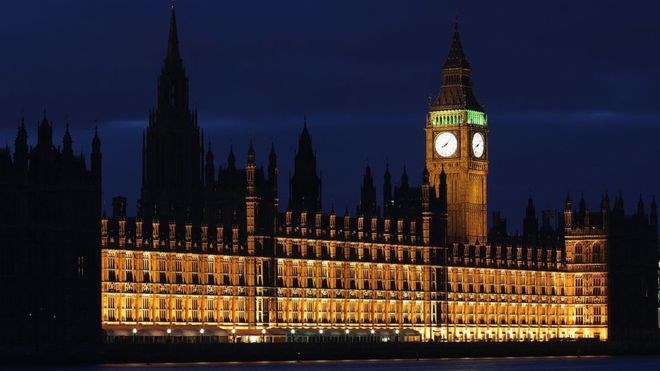
Will the party with the most MPs form the next government?
Not necessarily. The party with the most MPs, when the votes have been counted in all 650 constituencies, is normally described as the winner and its leader nearly always goes on to become the next prime minister.
But that might not happen this time if there is an inconclusive result. It is possible for the party that came second to form a government with the help of other parties.
How does someone win the election?
The easiest way to become prime minister is to win what is called a majority in the House of Commons - a majority is where your party has more MPs than all the other parties put together.
How many MPs do you need to form a majority?What happens if there is no clear winner of the general election?

Will the party with the most MPs form the next government?
Not necessarily. The party with the most MPs, when the votes have been counted in all 650 constituencies, is normally described as the winner and its leader nearly always goes on to become the next prime minister.
But that might not happen this time if there is an inconclusive result. It is possible for the party that came second to form a government with the help of other parties.
How does someone win the election?
The easiest way to become prime minister is to win what is called a majority in the House of Commons - a majority is where your party has more MPs than all the other parties put together.
The finishing line is 326. That would be enough for a government to vote through new laws without being defeated by their opponents. If they don't reach that number we have got what is called a hung Parliament.
What is a hung Parliament?
When no single party can get enough MPs to form a majority on its own the Parliament is said to be "hung". This happened at the 2010 general election.
What happens if there is another hung Parliament?
There will be another frenzied round of talks between the party leaders and their negotiating teams, as they try to put together another coalition government or a looser deal to put either Conservative leader Theresa May or Labour leader Jeremy Corbyn (the only two people with a realistic chance) into power as prime minister in 10 Downing Street.
Or one of the two party leaders could opt to go it alone and try to run a minority government, relying on the support of smaller parties when needed to get their laws passed.
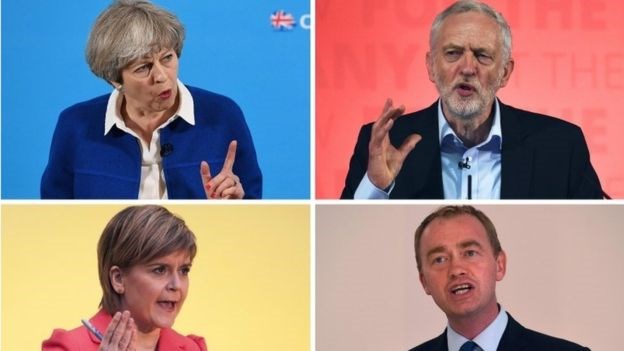
Who gets the first go at putting together a deal?
Theresa May will stay on as prime minister while she tries to put a majority together.
If it becomes clear that she can't and Jeremy Corbyn can then she will be expected to resign. Mr Corbyn would then become the prime minister.
But the Labour leader does not have to wait until Mrs May has exhausted all her options before he starts trying to put a deal of his own together. He can hold talks with potential partners at the same time as Mrs May. They may even be talking to the same people.
How long will it take?
There is no official time limit. It took five days to put the coalition together in 2010 but is generally expected to take longer than that.
Negotiations can't go on indefinitely, surely?
At the moment the first deadline is Tuesday 13 June, when the new Parliament meets for the first time. Mrs May has until this date to put together a deal to keep herself in power or resign, according to official guidance issued by the Cabinet Office.
But Mrs May must be clear that Jeremy Corbyn can form a government and she can't.
What if it is still not clear a new government can be formed?
The only test for whether a government can be formed is whether it has the confidence of the House of Commons.
In other words, can it assemble the votes it needs to get its programme of proposed new laws passed in the Queen's Speech? The scheduled date of the Queen's Speech is Monday 19 June.
Theresa May may opt to remain in power and gamble on getting enough votes from other parties to get her programme passed. If she has already resigned and handed over to Mr Corbyn, this will be the key test of whether the Labour leader can form a government.
If the SNP has as many MPs as the polls suggest they will, they could play a crucial role. Their position has been that they will not support a Conservative government.
What role does the Queen play?
The leader of the party that can tell the Queen they have a workable Commons majority is the one Her Majesty will authorise to form a government.
By convention, the Queen does not get involved in party politics, so there are no circumstances in which she would choose the prime minister.
There have been suggestions that she may not deliver the Queen's Speech in person if there's a question mark over whether it will get voted through.
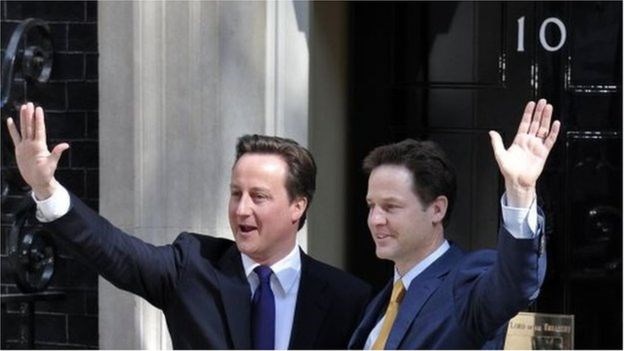
What is a coalition?
Image copyright PA
A coalition is when two or more parties join forces to govern as a single unit. The junior partners are given ministerial jobs and a joint programme for government is set out.
Will there be another coalition this time?
It seems less likely than in 2010. It depends on four factors:
- Whether the potential coalition partners have enough MPs between them to command a workable majority.
- Whether the biggest party wants to do it or would prefer to try governing alone as a minority government.
- Whether the potential partners can convince their respective parties that it is a good idea.
- Whether they can find enough common ground on policy - the junior partners will inevitably have to ditch some of their policies but they will insist on keeping others.
Jeremy Corbyn could lead a coalition with the SNP and the Lib Dems - although this is something he has said he would not do.
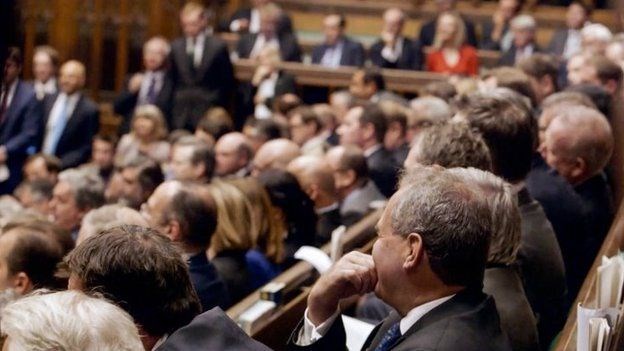
What is a minority government?
If the Conservatives or Labour are unable to put together a coalition or decide to go it alone, they can form a minority government, filling all the ministerial positions themselves.
This party would be unable to pass laws and legislation without the votes of other parties that are not part of the government.
For example, Labour could be a minority government with Jeremy Corbyn as Prime Minister - but would likely require the votes of the Scottish National party and Liberal Democrat MPs to get things done.
How many MPs would a minority government need for it to be a feasible option?
A party could fall well short of an outright majority and still run a minority government. Sinn Fein don't take up their seats in the Commons so if they return five MPs, the overall majority target falls to 323.
A new Conservative or Labour government would also face a fractured opposition. For it to be defeated, the Lib Dems, SNP, UKIP, Plaid Cymru, the Greens and the DUP would all have to gang up together to vote against it. This would not happen very much in practice. It is not enough for the losing parties to have more MPs than the "winner". They have to be able to form a coherent alternative.
So the party that finishes second in the election could form a government?
Yes. Although there is a question mark over whether the public would accept it.
How stable would a minority government be?
Britain has had minority governments before, although they have rarely lasted long.
The SNP governed in Scotland as a minority government between 2007 and 2011. It means the government has to form alliances and deals with smaller parties to secure their support in Commons votes - but they can achieve some stability by entering into a "confidence and supply" agreement with another party.
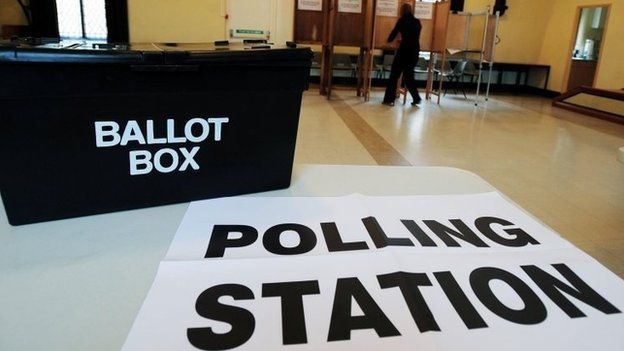
Will there be another election?
In the past, when minority governments have been formed at Westminster, the prime minister has held another election at the earliest opportunity to try and gain a working majority. Or the opposition has forced another election by tabling a "confidence" motion.
The Fixed-Term Parliament Act - passed by the Lib Dems and Conservatives to make their coalition less likely to collapse - means an election can only be held if:
Two-thirds of MPs vote for it. In practice, that would mean it would need to be supported by both Labour and the Conservatives
A motion of "no confidence" in the government is passed by a simple majority of MPs. An election must then be held within 14 days unless a new government can win a confidence vote before that period is up
Previously, if a government could not get a Budget or a Queen's Speech through the Commons, it was considered an effective vote of "no confidence".
But under the Fixed Term Parliament Act, the only confidence motion MPs can vote on is this: "That this House has no confidence in Her Majesty's government". This makes it more difficult to for a government to fall.
Is there any way round this?
We are in uncharted waters here. Britain does not have a written constitution and experts are divided over what may happen if no one can form a government.
Here are some alternative scenarios:
- If a "no confidence" motion is passed is in the Commons, the prime minister could hand the party leadership to a colleague, who could have another try at winning a confidence vote before the 14 day grace period is up
- If the prime minister wanted to trigger an early election, she could table a "no confidence" motion in her own government and order her MPs to abstain but, as YouGov polling expert Peter Kellner has pointed out, this would risk the ridicule of MPs and the public.
- The prime minister could resign, after being defeated on the Queen's Speech for example, and hand power to the leader of the opposition, who would attempt to govern until 2022. This raises the prospect of a change of governing party without an election - something that has never happened in Britain and would be likely to trigger a constitutional crisis.
So the prime minister may have to carry on even though she/he can't get key legislation passed?
It's possible. If a minority government is defeated on its Budget, the prime minister would normally follow this up with a confidence vote to trigger a new election.
But if the main opposition party does not want another election, because it thinks it could not win, then it could refuse to table a "no confidence" motion.
In that scenario, the prime minister could theoretically remain in Number 10, despite being defeated on a key part of her economic programme.
It's possible. If a minority government is defeated on its Budget, the prime minister would normally follow this up with a confidence vote to trigger a new election.
But if the main opposition party does not want another election, because it thinks it could not win, then it could refuse to table a "no confidence" motion.
In that scenario, the prime minister could theoretically remain in Number 10, despite being defeated on a key part of her economic programme.
No comments:
Post a Comment